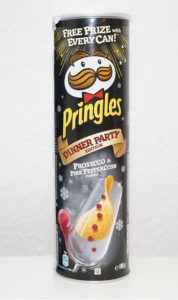 On 14th October 2019 the Italian authorities seized approximately 250 tubes of Prosecco and Pink Peppercorn flavoured Pringles crisps from supermarket chain Tosano in the Veneto region of Northeastern Italy. The ‘administrative seizure’ was ordered on the basis that the name Prosecco – which is protected as Designation of Origin (PDO) under EU Regulation 1308/2013 – was used ‘illegitimately’ on the crisps’ packages. Indeed. Pringles had not received approval from the Prosecco consortium to use the protected name. Teresa Bellanova, the Italy’s minister of agriculture, vowed to combat this kind of ‘identity theft’, while Luca Zaia, the president of the Veneto region (one of the two main Prosecco-producing regions in Northern Italy), took to Facebook to voice his grievances, stating that such acts will no longer be tolerated.
On 14th October 2019 the Italian authorities seized approximately 250 tubes of Prosecco and Pink Peppercorn flavoured Pringles crisps from supermarket chain Tosano in the Veneto region of Northeastern Italy. The ‘administrative seizure’ was ordered on the basis that the name Prosecco – which is protected as Designation of Origin (PDO) under EU Regulation 1308/2013 – was used ‘illegitimately’ on the crisps’ packages. Indeed. Pringles had not received approval from the Prosecco consortium to use the protected name. Teresa Bellanova, the Italy’s minister of agriculture, vowed to combat this kind of ‘identity theft’, while Luca Zaia, the president of the Veneto region (one of the two main Prosecco-producing regions in Northern Italy), took to Facebook to voice his grievances, stating that such acts will no longer be tolerated.
Yet, what the Italian authorities (and politicians) may have failed to take into account is how EU law regulates the use of protected geographical names in foodstuffs and alcoholic beverages. In fact, this case bears significant resemblance to a 2012 case which originated in Germany and eventually made its way to the Court of Justice of the European Union (CJEU). In that case, the Comité Inteprofessionnel du Vin de Champagne started proceedings against discount supermarket chain Aldi for selling a certain ‘Champagner Sorbet’ in its shops which (allegedly) infringed its protected PDO.
The main issue in that case was whether the producer of the sorbet in question exploited the reputation of the Champagne PDO. Indeed, EU Regulation 1308/2013 gives PDOs a wide protection by allowing their owners to prevent unauthorised parties from exploiting the evocative power of the protected names (Art. 103). However, by also referring to the European Commission’s Guidelines on the labelling of foodstuffs using protected geographical indications as ingredients (2010/C 341/03), the Court noted that what should be taken into account are the ‘essential characterisitic’ of the product, the taste or aroma of the ingredient being the defining characteristic of the product itself (such Guidelines require that the percentage of incorporation of the protected ingredient should “ideally be indicated in or in close proximity to the trade name of the relevant foodstuff or … in the list of ingredients”). Thus, the CJEU concluded that the use of a PDO in a foodstuff will not be considered as taking undue advantage (and therefore exploiting the PDO’s reputation) if the product incorporates as one of its essential characteristics a taste that is primarily attributed to champagne.
If we apply the CJEU’s reasoning to the Prosecco case, it appears that so long as the Pringles crisps incorporated the ‘gustatory quality’ of Prosecco, the essential characteristic criteria may be fulfilled and the crisps’ packaging would be unlikely to infringe the PDO in question. The only apparent distinguishing aspect which may be problematic in the Prosecco-Pringles case is that the crisp package does not list the percentage of the PDO ingredient used either in its trade name or in the ingredients list, as the above Guidelines require. Though potentially problematic, this would likely be an easy amendment for Pringles to make on its labels.
In their statement to the newspaper The Guardian, Pringles explained that the contested Prosecco and pink peppercorn flavoured crisps were produced in late 2018 as part of a limited edition holiday range. It would therefore appear that the packages still on the market are the remnants of that limited edition stock. In the same statement, Pringles also said it had no plans of producing this variant in the future. Whether this decision was influenced by the actions of the Italian authorities or had more to do with the sub-par reviews the crisp flavour received from consumers remains unclear.
It is therefore unlikely we will see this particular question reach the courts. Nevertheless, as Italian politicians continue their crusade against such acts, as they have vowed to do, it is equally unlikely that this will be the last case of this kind. Particularly with the holiday season approaching, food and beverage producers may be keen to add festive and ‘deluxe’ ingredients (many of which are PDOs) to spruce up their products, making for the perfect recipe for another CJEU judgment on the subject of PDO use.
_____________________________
To make sure you do not miss out on regular updates from the Kluwer Trademark Blog, please subscribe here.


